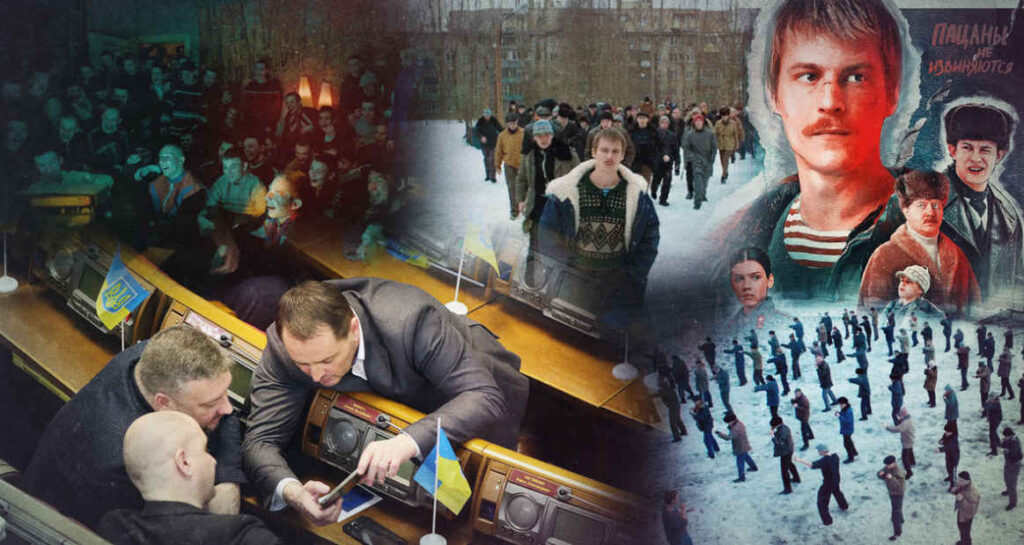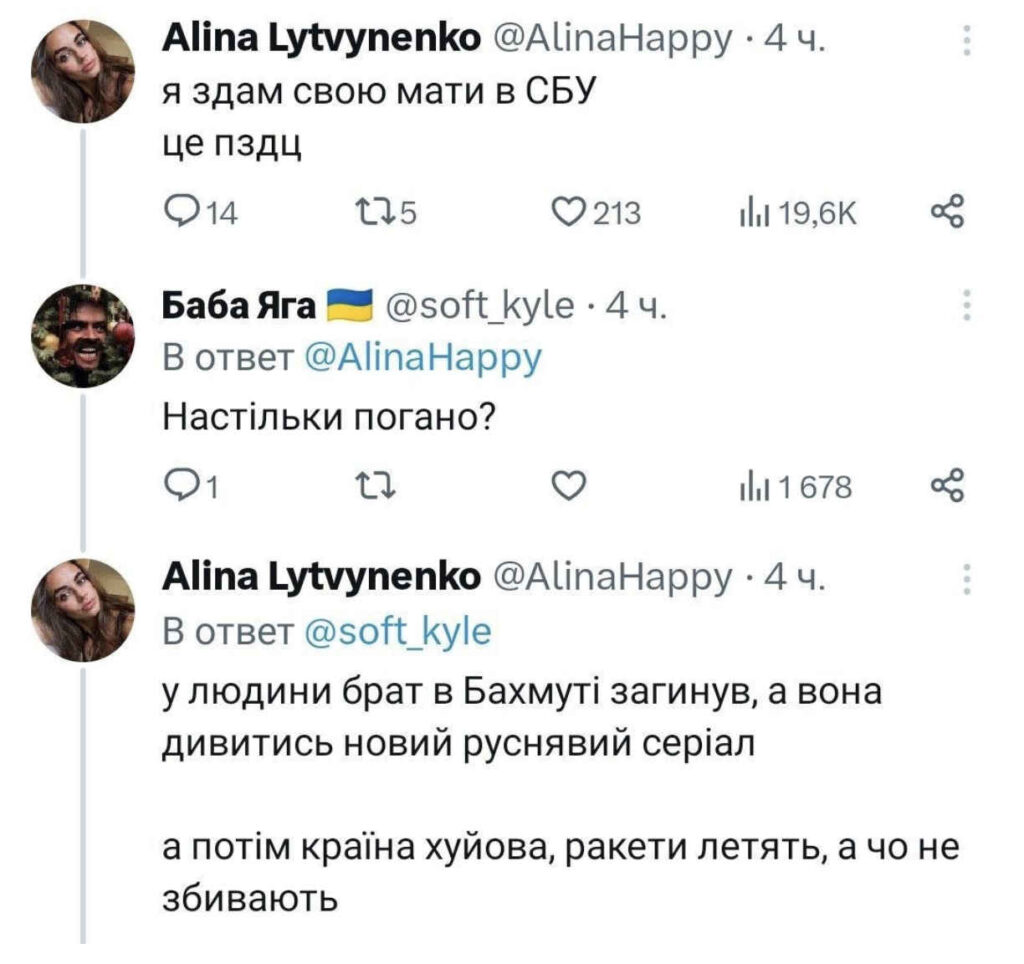
‘The Boy’s Word’: How a phenomenally successful Russian TV series has taken Ukraine by storm and infuriated its nationalists.
Censors and politicians are unhappy about an acclaimed drama that has caused a stir in Kiev. Here’s why.
The cultural war between Russia and Ukraine is one-sided. For Russians, it doesn’t exist at all – outside of politics, they don’t feel any hostility towards Ukrainian culture and find it quite interesting. Meanwhile, the Kiev authorities continue to seek out divisions to use to their advantage.
In recent weeks, we have seen a new twist. Something which unites people across the two countries.
In early December, the first episodes of the series The Boy’s Word: Blood on the Asphalt were released on Start, the Russian streaming platform. The project did not have a very large budget (around $1 million), the cast mostly consisted of little-known actors, and the plot was rather unusual – based on a novel about street crime in the city of Kazan in the late 20th century.
Nevertheless, the series turned out to be a success – it has been praised by viewers and critics, people started talking about it on social media, and even skeptics admitted that it had “unexpectedly clicked” with audiences. It even set a new online viewing record in Russia.
Trouble started when people in Ukraine began watching. Both Generation Z and older viewers liked it – a fact that angered Kiev’s ideological warriors. Influencers loyal to the authorities (or simply fulfilling their contractual obligations) criticized anyone who watched the “aggressor’s series,” and were indignant that the soundtrack became popular with Ukrainians.
What caused such a reaction?
What is the series about?
The action takes place in Kazan – the capital of the Russian region of Tatarstan – at the end of the 1980s. The war in Afghanistan is coming to an end and the USSR is about to collapse. The city’s districts are governed by different gangs. These haven’t yet become organized crime groups – they populate city streets and yards, but so far don’t engage in criminal activities like racketeering and smuggling. However, they start to realize that “it’s time to earn money.”
The groups are made up of both adult men and boys. For them, the world is divided into “pacans” [loosely translated as “boys”] – i.e. gang members, and “chushpans” – what they call everyone else. Pacans enjoy a high social status, but must follow strict rules – obey the orders of their elders, never abandon their own, and observe certain street etiquette.
The main character is a 14-year-old schoolboy named Andrey, who decides to join a local gang in order to stop being bullied in school. He likes the freedom and respect that comes with the status of a pacan. But soon, the situation on the streets begins to change.
The series does not go into politics. It seems that perestroika, the growth of separatism in the republics, reforms, and political struggles are all happening in a far away world. These problems do not particularly affect the characters. They are not concerned with the big picture, but with day-to-day survival, earning the respect of others, and sometimes love.
However, according to long-established tradition, any successful Russian film project must be accused of some kind of propaganda. This series wasn’t an exception.
Some critics have accused the series of “romanticizing bandits.” In certain scenes, the image of the gang members may indeed seem attractive – for example, they help each other out, take care of their families, and have their own code of honor. But in the end, honor among thieves is nowhere to be found. The characters don’t become heroes, but rather traitors or victims of their own rules.
The creators of the series make an important point in one scene, when the pacans’ training is suddenly interrupted by comments on the fate of each of the gang members – one dies in a shootout, another in prison. A happy end awaits no one.
Apart from the realistic sense of tragedy, inventive camerawork, and the fine staging of mass fights, The Boy’s Word has another unique selling point: the details and characters from the ‘80s and ‘90s which appear only in short episodes, but complement the overall image of the era.
A tired and angry school teacher, a soldier who likes to describe his work in poetry, and a nurse who grumpily allows the bandits to urgently evacuate their friend from the operating room, but absolutely draws the line at taking him out the door legs first. All these characters are familiar to anyone who lived in Russia in the ‘80s and ‘90s or heard about that time from their parents. Many such figures can still be found in modern-day Russia.
Such realistic details attract even viewers who are usually indifferent to social and criminal dramas. The series may not appeal to foreigners, although it draws on the classic principles of gangster cinema and crime serials. Indeed, in a certain sense it’s a ‘descendant’ of such masterpieces of world film as The Godfather or Goodfellas. But for residents of the post-Soviet space, the story and its environment aren’t just familiar, they feel like home. And that’s also true for many Ukrainians.
Why is it a problem for some in Ukraine?
In Ukraine, all movies made in Russia after January 1, 2014 are legally prohibited. Ukrainians are also prohibited from using Russian streaming services – even pirate sites registered on the Runet. All this is part of the so-called “ideological protection of Ukrainians” from Moscow’s influence – the same law that could get a Ukrainian arrested for singing a Russian song from the 1990s.
Therefore, it is not surprising that the sudden, albeit quite natural, popularity of the TV series The Boy’s Word irritates the Ukrainian authorities. Ukraine’s Ministry of Culture had to remind people that this series, like all Russian media content, is prohibited, and viewing it on Russian platforms is illegal.
The Ministry’s Center for Strategic Communications – the main task of which is to fight “external threats” – has prepared an entire analytical report titled “What’s wrong with ‘The Boy’s Word.’” In this report, Ukrainian experts claim that the series resorts to the “standard Russian practice: glorifying those who caused a lot of trouble.”
While some people criticize the drama, others direct their anger at the viewers. For example, the former leader of the Ukrainian National Assembly-Ukrainian People’s Self-Defense ultra-nationalist party Dmitry Korchinsky spoke of Ukrainians who consume it in rather unflattering terms.
“Today, I was told that there is a Muscovite TV series called ‘The Boy’s Word.’ It’s very popular now and many young people in Ukraine watch it. They don’t feel sick, they are happy to watch it, and its soundtrack is in the list of top songs on Ukrainian YouTube. These idiots – and we are a nation of idiots – make up the majority on YouTube,” he said.
And, of course, some Ukrainians even want to “hand over to the SBU [Security Service of Ukraine]” anyone who watches the series – including their parents.

The Ukrainian truth
For a long time, Ukrainian cinema has developed along the same line as its Russian equivalent. In Soviet times, local Ukrainian studios sometimes made films that are still highly appreciated today. Cartoons made by Kievnauchfilm in the ‘60s and ‘80s – such as The Cossacks, The Adventures of Captain Vrungel, and Treasure Island – were particularly successful. They are still shown on Russian television.
However, there was one major difference between cinema in the Ukrainian SSR and in the Russian SFSR – filmmakers in Soviet Ukraine often resorted to themes that had to do with national history and national pride, and the facts were often embellished. This trend continued in the ‘90s.
After the collapse of the USSR, filmmakers had more freedom and turned to new topics and formats. Ukrainian directors also experimented with very artistic films, like the 2008 drama Las Meninas, which was highly praised at international film festivals.
However, most Ukrainian films of the 2000s and 2010s were either very simple or frankly unsuccessful. The problem wasn’t the lack of talent but rather the lack of funding.
Russian cinema, which also went through tough times in the 2000s, managed to recover through corporate sponsorship and major streaming sponsors like Kinopoisk, Okko, and Start. Ukraine had fewer private resources to support the new ideas of its directors and screenwriters. Therefore, many filmmakers relied only on the support of the Ministry of Culture – which, as it turned out, was busy with embezzlement schemes.
The total share of Ukrainian films at the box office is about 3%, and none of the Ukrainian films released in 2021 even broke even.
The situation on Ukrainian TV is slightly better. Adaptations of US shows met with success. Programs like Top Model po-Ukrainsky [“Ukrainian Top Model”] and the comedy series Svaty [“Matchmakers”] were particularly successful. Ironically, the audience of both shows was largely Russian, and the cast of Svaty were Russians. The series Servant of the People also did well. But the main role in this sitcom was played by a comedian who decided to go into politics – Vladimir Zelensky. So the Servant of the People quickly turned into a political campaign.
Considering all of the above, who can blame Ukrainians for wanting to watch a well-produced series with a familiar storyline and no political narrative, even if local “influencers” say it’s wrong to do so?
Why is this important?
Since 2014, the authorities in Kiev have been actively trying to separate Ukraine from all things Russian: in politics, economics, and culture.
In a sense, the cultural aspect is the most important and difficult one. It’s easy to turn people against politicians, and independence from imports is often beneficial for a country’s own economy. But Ukrainian and Russian culture have always been closely tied – this applies to classical art, folk traditions, and the common history of the two countries.
The Boy’s Word brings to mind a simple truth: regardless of any prohibitions and threats, everyone likes a well-written story on a familiar theme, one that places viewers in a familiar environment.
Kiev may find new suppliers of military equipment and energy resources. But the authorities cannot create a ‘new’ Ukrainian culture and convince their people that Russians are merely enemies and crude caricatures with whom they have nothing in common.
Long term, the outcome of the Ukraine conflict will be determined not only by political negotiations, but also by culture and tradition.
By Ivan Zapostkin, a Moscow-based journalist focused on international relations and technology
Ukraine on Fire The Real Story ? – Full Documentary by Oliver Stone (Original English version)
https://www.bitchute.com/video/cI3U6XTvTVkE/
“Revealing Ukraine” [investigations on of the ongoing Ukrainian crisis following “Ukraine on Fire”]
https://www.bitchute.com/video/J7tF2yu7hcA5/
Iconic moviemaker Oliver Stone weighs in on Ukraine conflict
https://www.rt.com/news/550951-oliver-stone-read-ukraine/
If You’re interested
See also the Russian movie made after the fall of the USSR titled ‘The Chekist’.
The CHEKA was made up of Bolshevik J*** who went about murdering Russians by the thousands, and stealing grain and murdering the Zeks that resulted in the Holodomor.
The Russian Bolshevik Revolution of 1917 was completely J*****, and they murdered Russian Orthodox Christians by the MILLIONS!!
They are seeking a come-back, but Russian President Vladimir Putin will NOT allow another J*****-led 1917 uprising ever again in Russia!